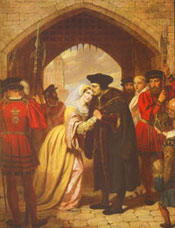|
|
St. Thomas More on Charity
More's love of God found expression not only in his prayer life but also in his fulfillment of Christ's command, "Love one another; even as I have loved you" (Jn 13:34). The poor were regularly welcome guests at his table; he would also go to them himself, visiting indigent families and bring them financial support as needed. When in the office of Lord Chancellor he was precluded from going in person, he delegated others of the household to bring succor to these people on his behalf. The infirm and the elderly were particularly singled out for his favors; for these he provided a special home in his own parish of Chelsea where they could be lodged and cared for at his expense. To widows and orphans he provided his legal services gratis; a widow named Paula who had exhausted all her savings in the courts he took into his family and sustained as if she were his kinswoman.
The King's Good Servant But God's First By: James Monti Page 77 )
Back to Quote Index
St. Thomas More on Conscience
[At his trial] More then cited scriptural texts proving that no layman could be head of the Church.
At this point Audley broke in to dispute his argument. How could More, alone, presume to challenge so stubbornly what all the bishops, universities, and best learned of this realm had agreed to support.
If the number of bishops and universities should be so material as your lordship seems to think, then I see little cause, my lord, why that should make any change in my conscience. For I have no doubt that, though not in this real, but of all those well learned bishops and virtuous men that are yet alive throughout Christendom, they are not fewer who are of my mind therein. But if I should speak of those who are already dead, of whom many are not holy saints in heaven, I am very sure it is the far greater part of them, who, all the while they lived, thought in this case the way that I think Now. And therefore am I not bound, my lord, to conform my conscience to the council of one realm against the General Council of Christendom.
So powerful were these and the other arguments that More made that Chancellor Audley was "loath to have the burden of that judgment wholly to depend on himself." His conscience having indeed been touched, he "openly asked advice of the Lord Fitz-James, then Lord Chief Justice of the King's Bench... whether this indictment was sufficient or not."
Fitz-James and the rest of the judges looked at each other for some time. Here was a moment of conscience that was undoubtedly acute. They knew that what More said was true; but they also knew that Henry, powerful lion that he was, would brook no opposition to his will.
Thomas More: Portrait of Courage By: Gerald B. Wegemer (Pg. 216)
More then proceeded to challenge --- also discreetly, of course --- the context and applicability of Audley's second fable. This story involved a lion and an ass going to confession, with results as different as the confessions themselves. In abbreviated form, this is how the story went: "The lion confessed that he had devoured all the beasts that he could come by. His confessor absolved him because [being a lion,] he was a king, and... it was his nature to [devour beasts]. Then came the poor ass and said that he took but one straw out of his master's shoe for hunger, by which action he thought that his master caught cold. His confessor could not absolve this great trespass, but by and by sent him to the bishop. "Lest the point of the tale be missed, Audley explicitly stated in conclusion: "I would not have your father so scrupulous of his conscience."
More's first comment on the tale was his rather understated observation that it "seems not to be Aesop's," since it is about confession and Aesop lived "in Greece before Christ's days." He then feigned ignorance of the moral of this perfectly obvious story. "It is somewhat too subtle for me," he said. "For whom his lordship understands by the lion and the ... bishop, of all these things can I nothing tell. But by the foolish, scrupulous ass, ... my lord's other words of my scruple declare that his lordship merrily meant that for me."
Shrewdly, More bypassed completely the issue of the lion's identity, but he cleverly and directly took up the charge that he himself was being a foolish ass by making himself overly dependent upon the judgment of Bishop Fisher. Despite his great respect for Fisher, he said, "I was not led by him in this matter." In fact, he explained, "I never intend, God being my good Lord, to pin my soul to another man's back, not even the best man that I know this day living: for I know not where he may happened to carry it. There is no man living of whom, while he lives, I may make myself sure. Some may act for favor and some may act for fear---and so might they carry my soul a wrong way. And someone might happen to frame himself a conscience and think that, while he did it for fear, God would forgive him. And some might think that they will repent and be absolved and so God will forgive them. And some may perhaps be of that mind that, if they say one thing and at the same time think the contrary, God more regards their heart than their tongue... But in good faith, Margaret, I can no such ways in so great a matter."
Thomas More - A Portrait of Courage By: Gerald Wegemer Pg. 175-6
Back to Quote Index
St. Thomas More on Duty
Reason tells us that the enduring of a temporary pain is worthwhile if by it a greater good is gained thereof; such is the case with certain medical treatments (such as the surgical procedures in More's own day) that a reasonable man will willingly undergo. Should not, then, reason building on the foundation of faith enjoin us to accept a painful death in order to attain the eternal joys of heaven and escape the unending pains of hell?
As to the terrible physical pains that can come with martyrdom, More now addresses the question of whether it is better to placate one's persecutors by exteriorly pretending to renounce the faith while interiorly continuing to adhere to it, and thereby escape the risk of faltering during torture and dying thereupon in apostasy. More finds such reasoning utterly unsound, comparing it to an unstable three-legged stool that collapses as soon as anyone attempts to sit upon it. In this analogy the three legs symbolize obsessive fear, false faith, and false hope. To begin with, it is absurd to think that the profession of one's faith in the face of persecution is a risky proposition, as if God would leave a person unaided and fail to grant him the grace to repent abandoning him summarily to damnation, if he faltered while suffering for Him. Furthermore, those who deny their faith exteriorly have a false faith, no matter what they may claim to profess interiorly. Finally, it is nothing less than a presumptuous and false hope to assume that if we deny Christ for the present in order to satisfy our persecutors, we can count on the grace of reconciliation with God when the threat of persecution has passed. Nor can we count upon suffering an easier death thereafter, for natural death can be just as painful, if not more so, in its duration and intensity than violent death.
The horrible end of those who renounce their faith to escape martyrdom becomes all the more evident when it is remembered that the pains of those who die in apostasy are but the prelude to the endless torments they will suffer in hell. Yet few realize that hell is actually a manifestation of God's mercy to us---a means for directing your steps here on earth toward heaven:
"But surely God in that thing wherein he may seem most rigorous is very merciful to us, and that is (which many men would little ween) in that he provided hell. For I suppose very surely, Cousin, that many a man and woman too, of whom there now sit some, and more shall hereafter sit full gloriously crowned in heaven, had they not first been afraid of hell, would toward heaven never have set foot forward."
James Monti The King's Good Servant But God's First p. 351-2
Back to Quote Index
|

















